Garnished with chic designs and with a far-reaching menu aiming to update Chinese cuisine, Bird Wo Wo clearly wants to broaden the appeal of the culinary traditions of China. And if the customer demographic observed on a recent visit is of any indication, the establishment woos an international and young crowd. Its offerings, however, are hit and miss.
First-time diners could be forgiven for confusing the Chinese restaurant with a cafe intended to titillate a female clientele. Brightly lit, the interior has a sleek color scheme of iron gray and white, adorned with decorative, feather-shaped patterns, mirrors and hanging ornaments made of beads. Those who wish to snap selfies and shout “How cute!” (好可愛) amid young women and girls might be disappointed though. On the weekday evening my dining partners and I visited, the majority of the diners appeared to be youngish white-collar workers. A cacophony of languages was also heard. Next to our table, a group of Japanese-speaking, suit-wearing businessmen seemed to enjoy their meals with bottles of Taiwan beer (NT$150 per bottle). On the other side, several men and women with Singaporean accents discussed work over glasses of red wine.
As for the food, the restaurant’s kitchen is designed to appeal to as many customers as possible, covering various regional cuisines ranging from Jiangsu and Zhejiang to Szechuan and Cantonese. Traditional dishes are often given an innovative twist. The boiled sliced pork and cucumber with garlic sauce (爽口薄片晾衣, NT$290), for example, is a creative rendition of boiled pork with garlic sauce (蒜泥白肉), a staple plate of the Szechuan cuisine. The photogenic dish offered a surprisingly savory explosion of flavors in the mouth, mixing the thin slices of fat-streaked pork, the freshness of cucumbers with the thick dipping sauce of garlic and honey. It was our favorite course of the evening.
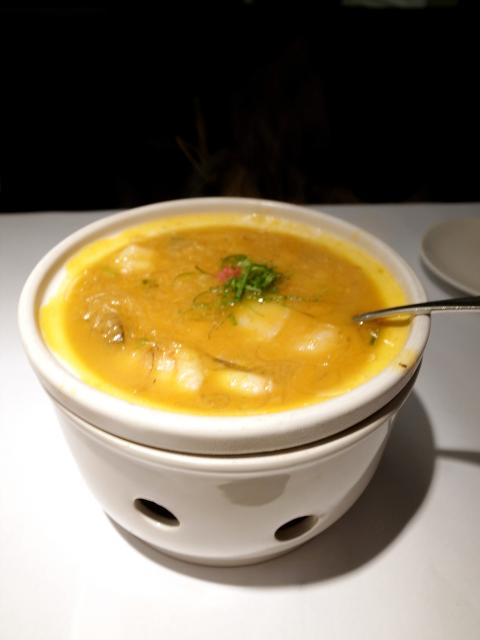
Photo: Ho Yi, Taipei Times
Another innovative attempt is the shaoxing millet bread with deep fried dry vegetables (紹興干菜窩窩頭, NT$320). Composed of preserved vegetables deep fried with pork and wrapped in brown sugar-flavored mantou (饅頭), or steamed buns, the dish was a saliva-inducing balance between the crispy, salty filling and the sweet, soft bun. The outer parts of the buns, however, were disappointingly soggy and left a blemish to the otherwise fun creation.
Recommended by our wait person, the braised dry pig skin with stinky tofu (美極皮肚臭豆腐, NT$360) didn’t impress with the less-than-ordinary quality of tofu, and the portion was skimpy for the price. Nor were we particularly enthusiastic about the braised crab roe with seafood and green bean noodle in casserole (蟹黃海鮮粉絲煲, NT$380), which was bland and dominated by sticky noodles.
Other popular dishes include deep-fried balsam pear (不像苦瓜, NT$280), deep-fried shrimp balls (灌湯黃金蝦球, NT$380), stewed pork with cabbage and eggs (提督官府燉菜, NT$380) and the chef special in casserole (宮廷一品皇罈子, NT$250), which features scallops, pig knuckle and king oyster mushrooms.
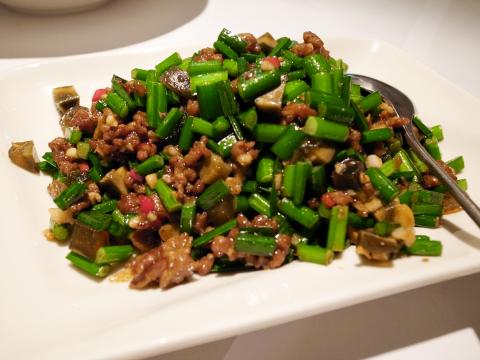
Photo: Ho Yi, Taipei Times
Surprisingly, the restaurant also has a small afternoon-tea menu filled with waffles, sandwiches, chocolate drinks and even a chocolate fondu. Why this Chinese restaurant wants to sell coffee and cake is anyone’s guess, but the Western-style offerings feel like an afterthought and might stretch the establishment’s creativity a bit too much.
Bird Wo Wo has several other venues — Neihu (內湖) and Tamsui (淡水) districts as well as in Greater Taichung and Greater Kaohsiung. For more information, visit the restaurant’s Web site at www.birdwowo.com.
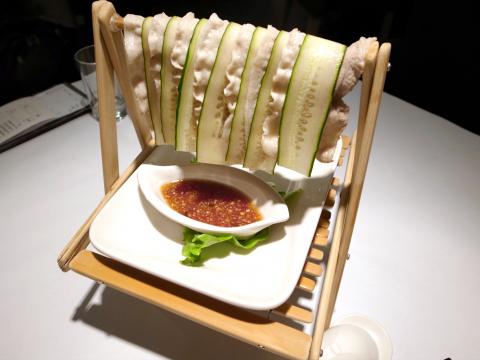
Photo: Ho Yi, Taipei Times
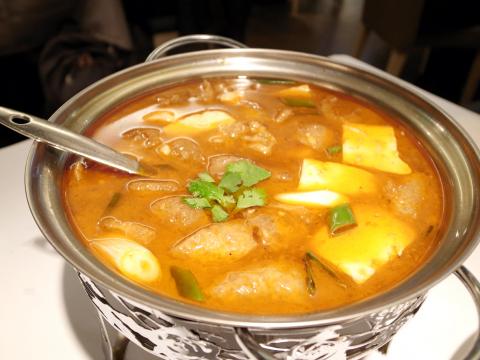
Photo: Ho Yi, Taipei Times
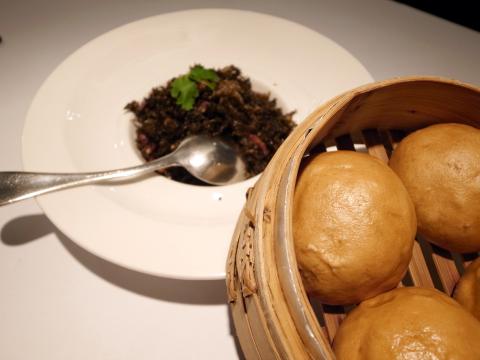
Photo: Ho Yi, Taipei Times

Towering high above Taiwan’s capital city at 508 meters, Taipei 101 dominates the skyline. The earthquake-proof skyscraper of steel and glass has captured the imagination of professional rock climber Alex Honnold for more than a decade. Tomorrow morning, he will climb it in his signature free solo style — without ropes or protective equipment. And Netflix will broadcast it — live. The event’s announcement has drawn both excitement and trepidation, as well as some concerns over the ethical implications of attempting such a high-risk endeavor on live broadcast. Many have questioned Honnold’s desire to continues his free-solo climbs now that he’s a

Lines between cop and criminal get murky in Joe Carnahan’s The Rip, a crime thriller set across one foggy Miami night, starring Matt Damon and Ben Affleck. Damon and Affleck, of course, are so closely associated with Boston — most recently they produced the 2024 heist movie The Instigators there — that a detour to South Florida puts them, a little awkwardly, in an entirely different movie landscape. This is Miami Vice territory or Elmore Leonard Land, not Southie or The Town. In The Rip, they play Miami narcotics officers who come upon a cartel stash house that Lt. Dane Dumars (Damon)

Francis William White, an Englishman who late in the 1860s served as Commissioner of the Imperial Customs Service in Tainan, published the tale of a jaunt he took one winter in 1868: A visit to the interior of south Formosa (1870). White’s journey took him into the mountains, where he mused on the difficult terrain and the ease with which his little group could be ambushed in the crags and dense vegetation. At one point he stays at the house of a local near a stream on the border of indigenous territory: “Their matchlocks, which were kept in excellent order,

Today Taiwanese accept as legitimate government control of many aspects of land use. That legitimacy hides in plain sight the way the system of authoritarian land grabs that favored big firms in the developmentalist era has given way to a government land grab system that favors big developers in the modern democratic era. Articles 142 and 143 of the Republic of China (ROC) Constitution form the basis of that control. They incorporate the thinking of Sun Yat-sen (孫逸仙) in considering the problems of land in China. Article 143 states: “All land within the territory of the Republic of China shall